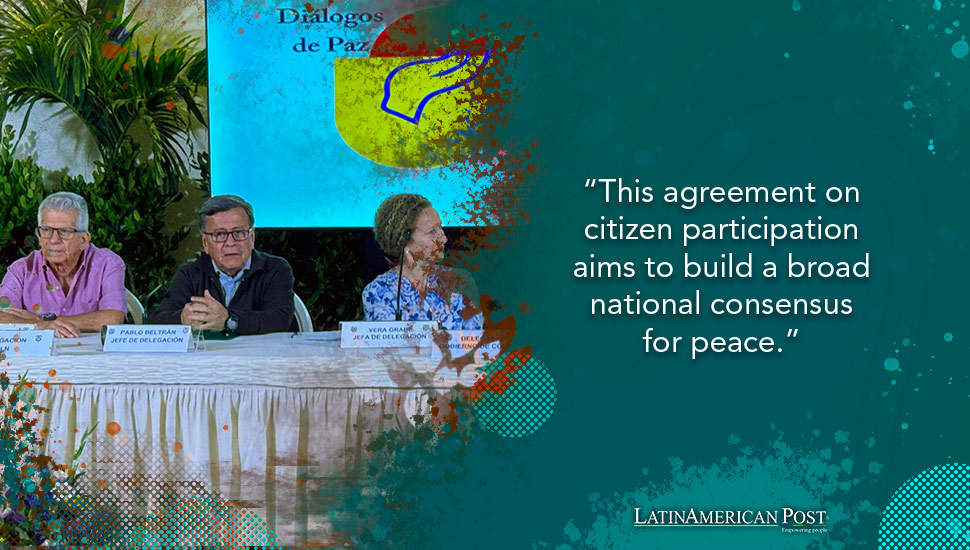Colombia’s Peace Process with ELN: A Milestone Amidst Challenges

In a significant development, the Colombian government and the ELN have signed the first of six points in the Mexico Agreement, marking a milestone in the ongoing peace negotiations. This agreement on citizen participation aims to build a broad national consensus for peace.
The peace process between the Colombian government and the Ejército de Liberación Nacional (ELN) has reached a pivotal moment with the signing of the first point in the Mexico Agreement, focused on citizen participation in the peace talks. This achievement, celebrated by the guarantor countries, the United Nations, and accompanying institutions, signifies a significant advancement in Colombia’s long-standing efforts to end armed conflict and build a lasting peace.
Colombia’s history of internal conflict spans over five decades, primarily involving the government, paramilitary groups, and guerrilla organizations like the FARC and ELN. The roots of these conflicts lie in deep-seated issues such as land inequality, political exclusion, and socioeconomic disparities. The FARC, the largest guerrilla group, reached a peace agreement with the government in 2016, a historic step toward national reconciliation. However, with its unique ideological stance and operational structure, the ELN has been more challenging to bring to the negotiating table.
The ELN, established in 1964, is inspired by Marxist-Leninist and liberation theology ideologies and aims to address social and economic injustices. Despite various attempts at dialogue, achieving a comprehensive peace agreement has proven difficult. The current negotiations represent the most sustained effort yet, involving significant international support and a detailed agenda addressing the underlying causes of conflict.
The Mexico Agreement: A Step Forward
The recent agreement signed in Caracas results from extensive discussions and consultations. It focuses on citizen participation in the peace process, a critical element for ensuring that the resulting contracts are inclusive and reflective of the Colombian population’s diverse perspectives. Over 80 meetings and input from more than 8,500 participants shaped this agreement, addressing critical issues such as political regime, economic model, environmental policy, education, and culture.
“Recognizing the commitment and determination of various actors involved in this effort marks a milestone in Colombia’s peace processes,” stated the guarantor countries—Brazil, Cuba, Chile, Mexico, Norway, and Venezuela—alongside the United Nations and the Episcopal Conference. This endorsement underscores the international community’s support for Colombia’s peace efforts and the importance of broad-based participation in shaping a sustainable peace.
Citizen Participation and National Agreement
The newly signed agreement is a blueprint for broader social and political alliances. It aims to create a “Great National Agreement” to remove violence from Colombian politics and address the country’s myriad challenges. By fostering broad-based participation, the agreement seeks to build a more inclusive political landscape where diverse voices can contribute to national decision-making.
“Citizen participation is crucial for legitimizing the peace process and ensuring that the agreements reflect the needs and aspirations of all Colombians,” said Iván Velásquez, Colombia’s Defense Minister, emphasizing the significance of this participatory approach. This framework is designed to promote dialogue and cooperation across different sectors of society, thereby laying the groundwork for lasting peace.
Challenges Ahead
Despite this significant progress, substantial challenges remain. The peace process has been fraught with difficulties, including violent incidents and internal divisions within the ELN. The recent escalation of violence in southwestern Colombia, particularly in the departments of Cauca, Nariño, and Valle del Cauca, underscores the fragility of the ceasefire and the complexities of negotiating with fragmented insurgent groups.
President Gustavo Petro’s administration has responded with a multi-faceted strategy, combining military measures with socioeconomic initiatives. This approach includes enhancing security operations to dismantle illegal economies, such as drug trafficking and illegal mining, which finance armed groups. Additionally, the government is coordinating with various ministries to develop infrastructure projects to improve living conditions and provide alternatives to illicit activities.
Citizen Participation and National Agreement
The newly signed agreement is a blueprint for broader social and political alliances. It aims to create a “Great National Agreement” to remove violence from Colombian politics and address the country’s myriad challenges. By fostering broad-based participation, the agreement seeks to build a more inclusive political landscape where diverse voices can contribute to national decision-making.
“Citizen participation is crucial for legitimizing the peace process and ensuring that the agreements reflect the needs and aspirations of all Colombians,” said Iván Velásquez, Colombia’s Defense Minister, emphasizing the significance of this participatory approach. This framework is designed to promote dialogue and cooperation across different sectors of society, thereby laying the groundwork for lasting peace.
Challenges Ahead
Despite this significant progress, substantial challenges remain. The peace process has been fraught with difficulties, including violent incidents and internal divisions within the ELN. The recent escalation of violence in southwestern Colombia, particularly in the departments of Cauca, Nariño, and Valle del Cauca, underscores the fragility of the ceasefire and the complexities of negotiating with fragmented insurgent groups.
President Gustavo Petro’s administration has responded with a multi-faceted strategy, combining military measures with socioeconomic initiatives. This approach includes enhancing security operations to dismantle illegal economies, such as drug trafficking and illegal mining, which finance armed groups. Additionally, the government is coordinating with various ministries to develop infrastructure projects to improve living conditions and provide alternatives to illicit activities.
International Support and Future Prospects
The involvement of international guarantors and institutions has been instrumental in advancing the peace talks. Their support provides a framework for accountability and encourages both parties to adhere to their commitments. The international community’s role in facilitating dialogue and offering technical and financial assistance is crucial for sustaining peace.
The agreement’s success will depend on continued engagement and effectively addressing ongoing challenges. The upcoming renewal of the ceasefire, set to expire on August 3, and the initiation of a new cycle of formal dialogues are critical next steps. Ensuring that these processes move forward smoothly will be essential for maintaining momentum and building trust between the negotiating parties.
Also read: Colombia and EMCDDA Partnership Enhances Drug Policy Effectiveness
The signing of the first point in the Mexico Agreement represents a hopeful milestone in Colombia’s quest for peace. By focusing on citizen participation, the agreement lays the foundation for a more inclusive and democratic society. However, the path to peace remains fraught with challenges, requiring sustained commitment and cooperation from all stakeholders.
Colombia’s peace process with the ELN is a testament to the resilience and determination of the Colombian people and their leaders. It reflects the broader struggle for justice and reconciliation in a country that has endured decades of conflict. As the process unfolds, the international community’s support and the active involvement of Colombian society will be crucial for achieving a lasting and meaningful peace.
International Support and Future Prospects
The involvement of international guarantors and institutions has been instrumental in advancing the peace talks. Their support provides a framework for accountability and encourages both parties to adhere to their commitments. The international community’s role in facilitating dialogue and offering technical and financial assistance is crucial for sustaining peace.
The agreement’s success will depend on continued engagement and effectively addressing ongoing challenges. The upcoming renewal of the ceasefire, set to expire on August 3, and the initiation of a new cycle of formal dialogues are critical next steps. Ensuring that these processes move forward smoothly will be essential for maintaining momentum and building trust between the negotiating parties.
Also read: Colombia and EMCDDA Partnership Enhances Drug Policy Effectiveness
The signing of the first point in the Mexico Agreement represents a hopeful milestone in Colombia’s quest for peace. By focusing on citizen participation, the agreement lays the foundation for a more inclusive and democratic society. However, the path to peace remains fraught with challenges, requiring sustained commitment and cooperation from all stakeholders.
Colombia’s peace process with the ELN is a testament to the resilience and determination of the Colombian people and their leaders. It reflects the broader struggle for justice and reconciliation in a country that has endured decades of conflict. As the process unfolds, the international community’s support and the active involvement of Colombian society will be crucial for achieving a lasting and meaningful peace.




